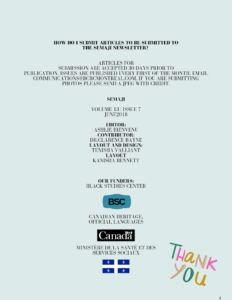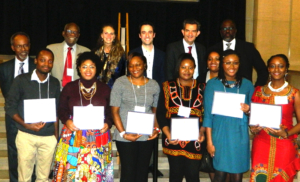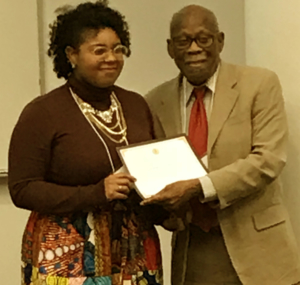The Black Communities of Montreal and Kauffman’s Complexity Catastrophes
By Dr. Clarence S. Bayne (President of BCRC)
EVIDENCED BASED DISCOUSES
A RELEASE FROM THE BLACK COMMUNITY RESOURCE CENTER BLACK COMMUNITY LEADERSHIP FORUM AND THE RIGHTS AND FREEDOMS COMMITTEE
This is a condition that occurs when a specie is fragmented in a large number of closed subgroups. R. Kauffman makes the observation that the specie tends to cluster around low levels of life and subsistence.
The Black community in Montreal is a fragmented set of sub-cultures that are, in many ways, closed to each other and isolated in the larger society. This is the result of immigration and country of origin, competitive rivalries based on race and place of birth, a history of Western colonial capitalism and slavery, and the economic and political arrangements and distribution of power in Canada.
The various communities tend to persist in sustaining strong regional loyalties, creating country of origin closed sub-cultures, and becoming further separated by the linguistic wars of British and French settler people’s. This congruence of events and attitudes set the stage for their resulting weak representation in the social, political and economic decision making processes of the country and province, the poverty and marginalization of the many and the restricted success of a very few Blacks across the country.
Based on these observations and reviews of a number of case studies and analyses, several English speaking Black organizations in Montreal (The Black Community Forum) came together for the purpose of overcoming Kaufman’s “complexity catastrophes”. The purpose was to reduce duplication and inter-organizational conflict. As a collective, they hoped to strengthen the strategic position of the isolated and ignored English speaking Black communities in this fractured multiculturalism of at least one, but not more than two, official languages. It is interesting to note that this collectivity is based on a collaborative, rather than a formal corporate structure. It is based on the evolving principle of “collaborative unity and existential responsibility.” The intent here is to avoid the hierarchical demagoguery of traditional failed national structures, and build trust through corporation and partnerships. Within that system the BCRC is a central agency with a Board of Directors that include a representative from each of the two major key community member organizations, the Black Studies Center and the Quebec Board of Black Educators. This structure and relationship has been in place for over twenty years.
Will the strategy of “collaborative unity and existential responsibility”, adopted by the Black Community Forum groups, pay off in terms of increased resources from the Federal and Provincial levels of government? Will it serve to stop the decline of the English speaking Black organizations and communities? This will require co-ordinated strategies at the Provincial and municipal levels.
In general, what seems clear is that any attempt to reverse initiatives in the English speaking communities of Quebec, as a whole, to design and create new arrangements that make living with Bill 101 more acceptable, will be disruptive of the social harmony. Increasingly, minorities as a whole are becoming more unwilling to accept the status quo and are demanding that their cultural and spiritual “selfs” be recognized and respected. More specifically, we at BCRC posit the following proposition: It would be crazy to expect Blacks to accept any form of modern slavery. Given that position and our relatively small numbers in the population, bounded rationality suggests that we will have to form alliances with progressive White French and English speaking citizens in a collaborative effort to create a better society.
WALKING THE LORD’S HIGHWAY
Activism is essential but not enough. Activism that chases every new event is non-productive. Activities not linked to core priorities are short term fillers. Hard grinding-stone vigilance and commitment to patient long term work is needed:
Walking on the Lord’s highway requires spiritual and physical endurance. It is not a place for dancing politicians and their aspirants.
We expect the Federal government to protect our rights under the Canadian Charter of Rights and Freedom. We expect that in all planning, policy development, governance and administration, article 27 will be respected. But we should not forget that it was a Liberal Federal government that betrayed us with the “notwithstanding clause”. Now it dangles a reconciliatory medal of $400 million before the eyes of the Linguistic minorities. It is encouraging that they have targeted Blacks in the budget and met with Black organizations as a collective group in Montreal on March 2, 2018. Hopefully, on an empowerment scale of 0 to 5, this indicates that they are aware of the necessity to address the needs of Blacks as distinct from that of the two mainstream cultural linguistic groups.
A GLIMMER OF HOPE
The BCRC, and its members, are actively engaged working with the QCGN to try to ensure that the recently created Secretariat for English speaking relations in Quebec has a life beyond any single government. We encourage all English speaking Blacks, and their colleagues, to support this initiative. Because it offers a glimmer of possible future participation. But most important, the BCRC, and its member organizations, are demanding organization participation and representation consistent with their arts, culture, education and community development mandates. The BCRC leadership member groups and partners are acting to ensure that the English speaking Black community does not sit in the Lazarus chair waiting for the crumbs that fall from those that dine at the table.
It is clear that our social and political situation in Quebec, as Black minorities, no matter what language we speak, is constrained by the quasi-constitutional arrangements between the mainstream English speaking and French speaking Canadians. As a result, in Quebec, the English speaking Blacks are excluded and discriminated against on the basis of both race and language spoken. This makes them unique, as compared to Blacks elsewhere in Canada, where language is less of a discriminant factor. Thus, we insist that the Federal Government, the Provincial Government and the Municipal Government speak directly to us, not through external agencies, be they Black or White. We have, in the past, collaborated with and sought the support of external and international agencies. We will continue to do so, because it makes practical sense and is consistent with many theoretical and probable perspective visions of future worlds. But our priorities will, and must, be determined within the framework of Quebec, and the conditions we live in Quebec, and with respect to the history of the struggle of Blacks in Quebec. In that sense, we will decide who our leaders are, not have them picked for us by the Government or others. Our problems cannot be solved by the uncritical use of models applied successfully in the context and histories of America, or Ontario, or Africa, or the Caribbean. We must develop our own experts and social innovators, not import them. Context is important in problem solving; always has been and always will be.
Searching the Landscapes of Montreal and Quebec for Solutions
The landscape in the Black community, like elsewhere, is rugged. There are many distractions. Trying to arrive at collective informed decisions is constantly being disrupted by the “me syndrome” or the fear among the rank and file of exploitation by what E. Franklin Frazier called the “Black bourgeoisie” and what the less generous Frantz Fanon called “the know-all, smart wily (local) intellectual” whose “only wealth is individual thought” and for whom your friendship is his road to greater success.
SAMPLE SURVEYS AND MISINFORMATION
We respect the opinion of sample survey experts who tell us that one cannot arrive at the best sense of the truth by polling the opinions of a non-representative set of respondents on a single Sunday in the year. Any informed person who says so, or attempts that, is being deceptive or engaging in misinformation. Hence the reason that polls for elections are taken repeatedly over extended periods of time. To avoid charges of misinformation, and to give generality to our discovery, we have tried to arrive at the priories of the community from many different sources and contexts. This is the direct opposite to prominent leaders approving the use of information based on a single badly drawn sample or poorly conducted internet survey that uses the same biased sample of persons to evaluate the process. It is utterly disgusting and insulting to our intelligence. We need to be aware that seventeen and eighteen year old Black youth at Dawson and Vanier in the social sciences have an in depth understanding of sampling, generalization and internal and external validity.
A quasi meta study survey
While no estimation method is perfect. This approach has more information than a single badly drawn sample. From the late 2016 to March 2018 we have had at least 25 community meetings, workshops, conferences and consultations with the federal, provincial and municipalities of the City of Montreal, the Sud-Ouest Borough, and the Cote des Neiges-NDG Boroughs. In 2017, Seven (7) Key meetings were organized by the Black History Month Round Table (BHRT) with respect to the Montreal 375th Celebration (in protest of the exclusion of Blacks). Two major conferences were held by the Black Community Forum (16 June 20116 and 27 October 2017) involving more than a 100 persons and 15 organizations from the English speaking Black Communities. Four sessions were held between the BCRC Secretariat for the Black Community Forum and the City of Montreal and two meetings with the Sud-Ouest and the NDG_CDN Boroughs. There were two economic forums, including the First International Black Economic Forum”. There were three consultations with the federal and the provincial governments; four community meetings of the Rights and Freedoms Ad Hoc Community Committee of BCRC; two community consultations by La Ligue des Noirs; and a consultation meeting (May 2017) called by Faculty of Education, University of Montreal, to discuss the findings of research conducted over 10 years on the performance of Blacks and other minorities in the French school system; and a meeting (28 July 2017) of a group of Black community experts in education and development with the Ministry of Education (services d’accueil et d’éducation interculturelle (par intérim)Ministère de l’Éducation et de l’Enseignement supérieur du Québec).
Based on the minutes, reports, survey results, proceedings case studies research, briefings and notes taken at these events the priorities of the Black community have emerged. Copies of these document are stored in the archives of the BSC and the BCRC. They are also accessible from the original source agencies (BHMRT, Black Community Forum, Faculty of Education U of M; Ministry of Education (6000 Fullum). It is interesting to note that these priorities are very similar to priorities developed by the Black Community Forum, Val Morin (July 1992) and revised and reaffirmed by a City of Montreal Black Communities Task Force in 2004 and the Black Community Forums of June 16 2016 and 27 October 2017. Elements of these priorities also correspond to those developed by QCGN studies setting priorities essential for a vital and sustainable English speaking minority communities in Quebec and used by the heritage department for informing their policies for funding (see QCGN Archives).
PRIORITIES OF THE BLACK COMMUNITIES OF MONTREAL
Based on the evidence derived from these sources described above, the following summaries of Black Community priorities are presented. The following are the priorities that the Black Community Forum has adopted and presented to community organizations, and all levels of Government, as priorities that they must respect for Blacks in Montreal. While different leadership groups may assign different ranking to the items in this list, we know of no Black organizations, nor network of organizations in Montreal, that reject these as not being critical and comprehensive.
- Support for the Black Family
- General Health and Mental Health
- Youth, Education, Employment and Employability
- Arts and Culture
- Rights and Freedom: Anti-Racism Strategies
- Economic Development
- Reinforcement of Community Structures
- Mechanisms for reducing isolationism and fragmentation: Black community archive and communication network systems and centers.
For Full Version of Semaji April 2018 Click Here





